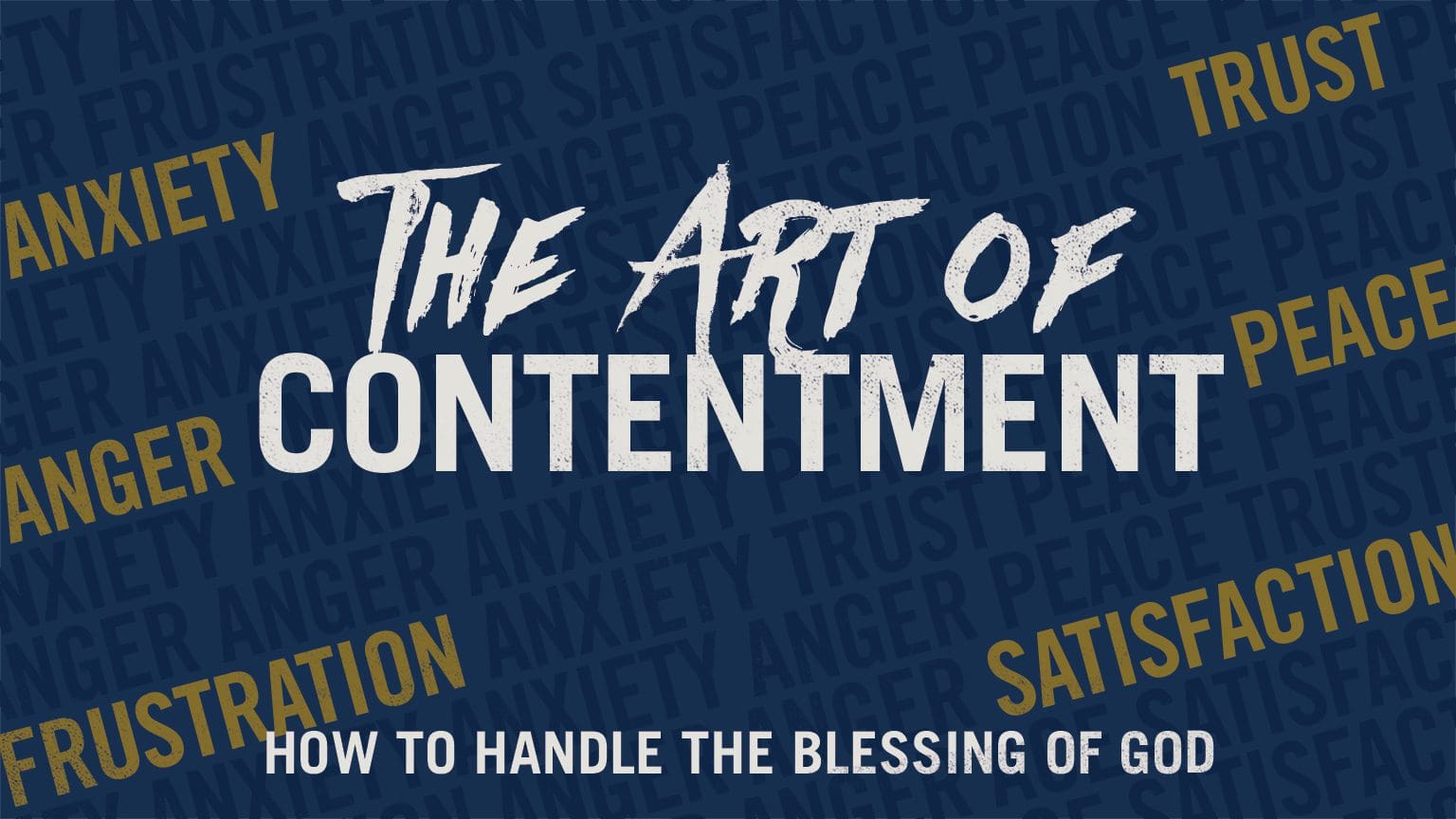The people thirsted there for water, and the people grumbled against Moses and said, “Why did you bring us up out of Egypt, to kill us and our children and our livestock with thirst?” (Exodus 17:3)
Today we begin a four week series entitled The Art of Contentment. If you are wondering why we would devote the whole month of May to this one subject, there are two reasons. When a pastor preaches the Word of God, he must speak out of what he has received from the hand of God and into the needs of the people and the times.
There is both a personal and a public element in the ministry of the Word. With regard to the personal element, some years ago I came to a place of wanting to gain a greater sense of peace in my own life.
I have been blessed to serve as a pastor for 36 years in two wonderful churches in the suburbs of two world-class cities—London and Chicago. There is a relentlessness about life in our cities—always chasing after the next thing—and I like that.
I want to live flat out for the glory of God, but some time ago I came to a place of wanting to do that with a greater sense of peace. So for some time now this subject of contentment has been a focus of my thinking, reading, praying, learning, and, I hope, growing.
The second reason is public. We are in a season when anger seems to dominate our public life. Someone said to me recently, “I don’t think I can remember a time when people were so angry.” Civility seems to be forgotten and our country is more polarized perhaps than at any other time in recent memory. People are frustrated. We don’t seem able to subdue the threat from the terrorists. There does not seem to be a clear vision for the future around which people can unite. And, as a result, people are anxious.
Take these three words—anger, frustration, and anxiety. Contentment is about moving from anger to peace, from frustration to satisfaction, and from anxiety to trust. So this series speaks directly to where we are and what we need today.
My own journey with regard to contentment began some time ago when I came across a sermon by Thomas Boston, a seventeenth-century Scottish pastor, on the 10th commandment called The Hellish Sin of Discontent.
The Hellish Sin of Discontent! My first thought was Really? The Hellish Sin of Murder maybe, but The Hellish Sin of Discontent? Was Thomas Boston justified in using this title? I am convinced that he was, and that is why I am using his title for this message today. We are beginning our series with the sin of discontent for this reason: We will only get serious about pursuing contentment if we are convinced that the lack of it is a hellish sin.
My aim for today is that, by God’s grace, every one of us will leave here saying, “I never saw my anger, frustration and worry as a hellish sin before… but now I do. And seeing that discontent is a hellish sin, by the grace of God, I am going to set about pursuing a greater contentment. I am going to deal with discontent in my life, and I am going to grow in peace, satisfaction and trust, and I am going to go after it this month!”
I want you to see this in the book of Jude, and this is perhaps the only time you will hear me say this—I don’t want you to look it up. We are going to play “fill-in-the-blank.” Jude is speaking about God’s judgment that will come upon the wicked.
Behold, the Lord comes with ten thousands of his holy ones, to execute judgment on all and to convict all the ungodly of all their deeds of ungodliness that they have committed in such an ungodly way, and of all the harsh things that ungodly sinners have spoken against him. (Jude 14-15)
God is coming to execute judgment and four times he refers to the ‘ungodly.’
- He comes to convict the ‘ungodly.’
- He convicts them of their ‘ungodly’ deeds.
- These deeds have been committed in such an ‘ungodly’ way.
- They are accompanied by harsh words ‘ungodly’ sinners have spoken against God.
When God speaks about the ungodly four times in one verse, you know what that verse is about. It is about the ungodly who come under the judgment of God. Then Jude goes on to explain who the ungodly are.
These [the ungodly] are . (Jude 16)
What would you think belongs in the blank? The ones on whom God comes to execute judgment. The ones he comes to convict of all their ungodly deeds and words. These are the Murders? Adulterers? Thieves? Rapists? Terrorists? For sure, but none of these are mentioned here.
[The ungodly] are grumblers, malcontents, following their own sinful desires. (Jude 16)
So here is the first reason that discontent is rightly described as a hellish sin.
Discontent Is a Hellish Sin
Because It Leads to Hell
God comes to execute judgment on the ungodly. And who are the ungodly? Grumblers and malcontents.
I looked up ‘malcontent’ and got two definitions:
Malcontent—a person who is always or often unhappy, one who bears a grudge from a sense of grievance or thwarted ambition. [1]
- Others seem to have more going for them than you do—better gifts, better looks, better opportunities, and you are not happy with what God has given you.
- You are frustrated in your marriage or with your children. Other people seem to have compliant children, and you have one who is not easy. You are not happy about that.
- Your friend has a home that is larger than yours, vacations that are more exotic than yours, and it all comes from a salary that is bigger than yours. You look at that and you find yourself saying, “Why him? Why her? Why them… and not me?”
Your life is not as you want it to be, your family is not as you want it to be, your work is not as you want it to be, and the church is not as you want it to be—you are not happy. You have a sense of grievance about you, and if that gets hold of you, it will take you to a dark place.
Instead, say to yourself: “This is discontent and people are in hell today because of this. Christ came to save me from hell. I must ask him to deliver me from this hellish sin.”
Discontent Is a Hellish Sin
Because It Comes From Hell
Hell is a place of perpetual discontent. People in hell are always angry and never at peace, always frustrated and never satisfied. That is surely the significance of our Lord’s words about “gnashing of teeth” (Mat. 8:12; 13:42, 50; 22:13; 24:51; 25:30).
There are three sins that lie behind discontent—pride, rebellion and unbelief. These are the original sins of the devil and his angels. They are sins that come from hell itself and they continue in hell forever.
1. Discontent is a manifestation of pride.
These [the ungodly] are grumblers, malcontents, following their own sinful desires; they are loud-mouthed boasters, showing favoritism to gain advantage. (Jude 16)
Discontent is a manifestation of pride. It flows from a heart that says, “I deserve better than God has given me.” This was the original sin of Satan himself.
In our letter of Jude, we have a reference to angels who, like Satan, were not content to be the servants of God, “angels who did not stay within their own position of authority, but left their proper dwelling” (Jude 6).
Pride led some angels to say, “We deserve better than God has given to us!” God gave them positions of authority, but they were not content. They are not content now. They never will be. Thomas Boston says, “The devil is the proudest creature and the most discontented because pride and discontent lodge under one roof.”
I deserve better than God has given me! If I catch myself thinking like that, I have to take myself in hand. I have to say to myself: That is the opposite of everything I believe! I believe that God has given me abundantly more than I ever deserved. What I deserve is hell on earth followed by hell in hell. But God has loved me. God gave his Son for me.
God has blessed me with every spiritual blessing in Christ. He has given me all that I need for life and godliness. In all things his love surrounds me, and in all things he pursues his great purpose, which is also my purpose, that a true likeness of his Son, Jesus Christ, be formed in me. Discontent is a hellish sin because it is a manifestation of pride.
2. Discontent is an expression of rebellion.
In the Old Testament we have the story of Job, a good and godly man who was greatly blessed by God. His family was blessed, his business was blessed. Job was living the dream, and then one day through a series of disasters, he lost everything. Job said, “The Lord gave, and the Lord has taken away; blessed be the name of the Lord” (Job 1:21).
The discontented person says something different. The discontented person says, “The Lord gave, but he should have given more.” Or, “The Lord has taken away and he should not have done that.” Jude talks about “harsh things that ungodly sinners have spoken against God.”
Discontent is a hellish sin because, at its heart, it is an expression of rebellion against God. The clay says to the potter, “Why have you made me like this?” (Rom. 9:20). “God, you should have done something different!” That’s rebellion and the Scripture says, “Who are you to speak like that to God?” (Rom. 9:20).
3. Discontent is a fruit of unbelief.
You see this is Exodus 17. God’s people had been greatly blessed. He brought them out of slavery in Egypt and he provided manna to feed them in the wilderness. Often those who are most blessed are most discontented!
Then God’s people came to a place where there was no water. Now that is a legitimate concern. And there are times in life when we may have legitimate concerns about how God will supply what we need. But their legitimate concern metastasized into unbelief. They tested the Lord by saying, “Is the Lord among us or not?” (17:7).
They were redeemed people, but they lost confidence that God was with them. If you no longer believe that God is with you, you will no longer be confident that he will supply what you need. And it will not be long before the grumbling begins and you find yourself sliding into the hellish sin of discontent.
Discontent Is a Hellish Sin
Because It Brings a Taste of Hell
Hell is a place of torment, and discontent makes a person his or her own tormentor. When discontent gets a grip in your life it brings a taste of darkness, sorrow, and loss.
1. You waste precious time.
I found this in Jeremiah Burroughs, who wrote a Christian classic called: The Rare Jewel of Christian Contentment. Burroughs said, “By murmuring and discontent in your hearts, you come to lose a great deal of time.” [2]
That has been very striking to me. How much time is wasted by brooding over what might have been: If I had done this. If I had pursued that! If only I had not made this or that foolish mistake! Your time and energy are all tied up in what might be, what could be.
Don’t waste the time you have by dreaming of a life you have not been given. It’s a waste! God is calling you to live the life that you have, as it is right now, and to do this for his glory.
2. You lose discernment.
We see this especially in Numbers 16, where we read about God’s people grumbling in the desert. As they complain against Moses, they are losing touch with reality, “You have brought us up out of a land flowing with milk and honey, to kill us in the wilderness, that you must also make yourself a prince over us?” (Num. 16:13).
So Egypt, where they made bricks without straw, is now a land flowing with milk and honey!
And Moses, the great deliverer, who gave up life in a palace to take his stand with the people of God, is now out to make himself a prince and to kill God’s people! Discontentment will lead you to exaggerate the blessings of yesterday and lose sight of the blessings of today.
3. You lose your joy.
If discontent takes root in your soul, you will lose the joy of what you have. Whatever you have, it will never be enough. A discontented person can never be satisfied. What a foolish thing it would be to lose the joy of what you have because you cannot get what you want.
4. You may add to your sorrows.
There are many examples of this in the Bible, but one of the most striking is the story of Rachel, who was married to Jacob. She saw her sister, Leah, having children and, as the years passed, it got to her. Rachel wanted children.
This is a tender and sensitive issue. Here is something that I really want in my life, and God has not given it to me. For some it may be the gift of children, for others marriage, for others a particular ministry or some other dream that you really wanted but it has not happened.
Rachel was not happy. She was not content with what God had given in her life. Scripture records that “When Rachel saw that she bore Jacob no children, she envied her sister. She said to Jacob, ‘Give me children, or I shall die!’” (Gen. 30:1). “If I don’t have this, my life isn’t worth living. I have to have it.” That discontent cost Rachel her life. She died in childbirth.
Now let me be clear—Rachel was a dearly loved child of God. If you belong to Jesus Christ you will see her in heaven. God is the great Redeemer. The first child born to Rachel was Joseph, and the child whose birth cost her life was Benjamin. God’s great purpose was wonderfully advanced through them.
But we must not miss from this story that it is possible to want something that God has not given so much that you bring sorrow into your life that you would not otherwise have had. What if having what you want should prove to be the greatest burden and the heaviest cross of your life? What if God’s withholding is part of his kindness towards you?
It is possible to want something that God has not given too much. There’s a big difference between saying, “Lord, give me children, but whatever happens I will love you and live to honor you.” And “Give me children or my life isn’t worth living! Give me children or I die.”
Remember the principle of the manna. When you gather what God gives it is a blessing to you. But when you try to grasp more, it goes bad on you.
I hope that you are now ready to deal with discontent.
I hope you are in a place of saying, “I didn’t think too much about this before, but now I see that I need to deal with this hellish sin wherever it rears its ugly head in my life. I need to get beyond the idea that moaning and complaining doesn’t matter. I need to get serious about moving from anger to peace, from frustration to satisfaction, and from anxiety to trust.”
Thank God there is a Savior to whom we can come. Ask him to forgive this hellish sin if you see it in your life today. Ask him to cleanse you and to wash this out of your heart. Then ask him to help you grow in contentment.
Here is what you will find: Peace in life comes from knowing that everything that concerns you is in the hands of the Savior who loves you. Satisfaction lies in knowing that in Jesus Christ you have all that you need. Trust begins when you know that he is faithful, and those who look to him are never put to shame.
Alan Redpath says, “There is nothing – no circumstance, no trouble, no testing – that can ever touch me until, first of all, it has gone past God and past Christ right through to me. If it has come that far, it has come with a great purpose, which I may not understand at the moment. I refuse to panic. And as I lift up my eyes to him… no circumstance will cause me to fret, for I shall rest in the joy of what my Lord is – that is the rest of victory!”
[1] Merriam-webster.com
[2] Jeremiah Burroughs, The Rare Jewel of Christian Contentment, p. 153, Banner of Truth, 1964.
[elementor-template id=”128476″]






